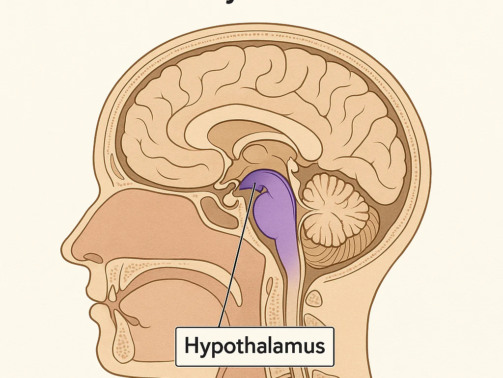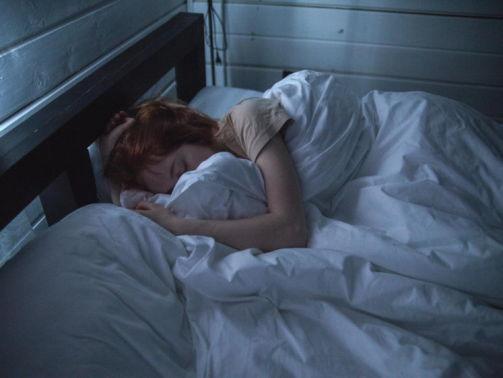Sleep Science
An Injury to Which Region Would Interfere with the Sleep-Wake Cycle?
Understanding the Sleep-Wake Cycle The sleep-wake cycle, or circadian rhythm, is a fundamental b ...
What If Humans Didn’t Need Sleep? Exploring a Sleepless World
Imagine a world where humans didn't need sleep. The implications of such a reality would be profoun ...
Understanding Sleep Science: The Complex Mechanics of Restorative Sleep
Sleep science is an interdisciplinary field that explores the biological, neurological, and psychol ...
Sleep Science Subcategory Overview: Understanding the Biology and Benefits of Rest
Sleep science is a growing and multidisciplinary field that uncovers the complex biological mechanisms behind sleep and its vital role in human health. From brain function to immune support, understanding the science of sleep helps individuals improve their well-being and performance. At reviveyourfitness.com, we emphasize the importance of restorative sleep as a key pillar of health, alongside nutrition, exercise, and stress management.
What Is Sleep Science?
Sleep science, or somnology, is the systematic study of sleep and the biological processes associated with it. Researchers in neurology, psychology, endocrinology, and chronobiology collaborate to understand how sleep works and why it’s so essential. At the heart of sleep science are several key concepts:
Circadian Rhythms: The body’s internal 24-hour clock, which regulates sleep-wake cycles, hormone release, and metabolism. Disruption in circadian rhythms is linked to conditions like jet lag, insomnia, and metabolic disorders.
Sleep Architecture: The structure of sleep is divided into different stages, each playing a unique role in physical and mental restoration.
Neurochemical Regulation: Sleep involves complex signaling between brain chemicals and hormones like melatonin, cortisol, serotonin, and adenosine.
Key Sleep Stages Explained
A full sleep cycle includes both non-REM (Rapid Eye Movement) and REM sleep, cycling approximately every 90 minutes. Each stage contributes differently to health:
Stage 1 & 2 (Light Sleep): Transitional phases where heart rate slows, muscles relax, and brain activity begins to decrease. These stages are important for preparing the body for deeper restorative sleep.
Stage 3 (Deep Sleep): Often called slow-wave sleep, this is when tissue repair, muscle growth, and immune system strengthening occur. It’s crucial for physical recovery and health maintenance.
REM Sleep: Brain activity increases, dreams occur, and memory consolidation takes place. REM sleep supports emotional regulation and cognitive performance.
Understanding these stages explains why sleep quality matters more than merely the number of hours spent in bed. Interrupted or shallow sleep may prevent the body from reaching restorative deep and REM stages, leading to fatigue, mood issues, and impaired performance.
The Importance of Sleep for Total Health
Sleep plays a foundational role in nearly every bodily system. Research published in top journals emphasizes the link between quality sleep and long-term wellness. At reviveyourfitness.com, we advocate that sleep is not a luxury but a necessity. Key benefits include:
Immune Function: Sleep enhances the body’s ability to fight infections and inflammation. Chronic sleep deprivation weakens immune responses.
Mental Clarity and Mood: Restorative sleep boosts attention, memory, and decision-making while stabilizing emotions. Poor sleep is associated with irritability, depression, and anxiety.
Physical Performance: Athletes and fitness enthusiasts benefit from improved coordination, strength, and reaction time with adequate rest.
Heart and Metabolic Health: Sleep helps regulate blood pressure, blood sugar, and cholesterol. Poor sleep is a risk factor for obesity, diabetes, and cardiovascular disease.
Weight Management: Hormones like ghrelin and leptin, which regulate hunger and satiety, are influenced by sleep. Disrupted sleep can lead to overeating and weight gain.
Popular search queries like “the science of sleep and its importance” and “how sleep affects metabolism” show how people increasingly understand sleep’s vital role in achieving and maintaining health.
Sleep Science and Mental Health
There is a profound connection between sleep and mental well-being. Chronic sleep deprivation can contribute to, or exacerbate, mental health conditions such as:
Anxiety: Poor sleep increases the brain’s emotional reactivity and sensitivity to stress.
Depression: Disrupted REM sleep and sleep onset latency are common in depressive disorders.
Cognitive Decline: Lack of sleep impairs memory consolidation and brain plasticity, potentially accelerating neurodegenerative conditions like Alzheimer’s.
Sleep scientists also study specific disorders like:
Insomnia: Difficulty falling or staying asleep, often linked to stress and anxiety.
Sleep Paralysis: A frightening condition where one is mentally awake but unable to move, often studied in the context of REM disruption.
Sleep Apnea: Interrupted breathing during sleep, leading to daytime fatigue and increased cardiovascular risk.
Search terms such as “science of sleep for mental health,” “science behind sleep paralysis,” and “how sleep affects mood and brain health” are frequently used by people seeking deeper understanding and solutions.
How to Improve Sleep Quality: Evidence-Based Tips
Incorporating strategies backed by sleep science can dramatically enhance rest and recovery. Reviveyourfitness.com recommends:
Consistent Sleep Schedule: Go to bed and wake up at the same time daily to support circadian alignment.
Sleep-Friendly Environment: A cool, dark, quiet room optimizes melatonin production and relaxation.
Limit Blue Light Exposure: Reduce screen time before bed or use blue light filters to avoid disrupting melatonin.
Mindful Evening Routine: Activities like gentle stretching, meditation, or reading can ease the transition into sleep.
Watch Stimulants and Meals: Avoid caffeine late in the day and heavy meals close to bedtime.
Sleep Science at ReviveYourFitness.com
At reviveyourfitness.com, we integrate sleep science into personalized wellness plans that include training, nutrition, and recovery. We believe true fitness is impossible without quality rest. Our sleep optimization resources help users:
Understand their sleep needs based on age, activity level, and health conditions
Use sleep tracking tools to monitor patterns and improvements
Identify potential sleep disorders and seek professional help
Our content aligns with the latest sleep science research and aims to educate and empower our readers to take control of their sleep health.
Tracking Sleep Patterns
Advancements in technology allow for precise sleep tracking using:
Apps and wearables
Heart rate monitors
Movement and respiration sensors
Popular tools and searches:
Rise science sleep tracker
Best time to sleep according to science
Certified sleep science coach
Tracking helps users make evidence-based adjustments to improve sleep habits.
Sleep Environment and Behavior
Behavioral sleep science encourages environmental optimization:
Sleep in a cool, dark, and quiet room
Use supportive bedding
Avoid blue light before bed
Stick to a consistent schedule
These habits are central to sleep hygiene and behavioral sleep medicine.
Sleep and Performance
Sleep enhances performance in:
Athletics – recovery, endurance, coordination
Academics – learning, memory, focus
Professional life – productivity and decision-making
Scientists examine how rest boosts both physical and cognitive performance.
Mattresses and Sleep Quality
A major consumer application of sleep science involves mattress choice:
Is a firm mattress better for sleep?
Best mattress for sleep quality
How sleep systems affect recovery
Factors such as spinal support, temperature regulation, and comfort impact overall sleep quality.
Melatonin and Sleep Hormones
Melatonin regulates sleep-wake cycles and is a common supplement. Sleep science explores:
Melatonin production and timing
Impact of artificial light
Effectiveness of melatonin supplements
Searches like sleep science melatonin highlight the growing interest in hormonal influence on sleep.
Sleep Research in Academia
Academic institutions run sleep science centers to explore:
Behavioral and neurological sleep studies
Sleep disorders
Sleep deprivation and cognition
Popular queries include:
Sleep science center research
Sleep studies for sleep disorders
Effects of sleep deprivation on mental function
These studies inform clinical practices and public health policies.
Behavioral and Educational Approaches
Educational sleep science promotes better sleep through:
Sleep hygiene education
Mindfulness and CBT-I (Cognitive Behavioral Therapy for Insomnia)
Books and resources on sleep science
Topics include:
Books about sleep science
How sleep works
How to improve sleep naturally
Sleep and Adolescents
Adolescents face unique challenges when it comes to sleep, driven largely by biological changes in their circadian rhythms. As teens go through puberty, their bodies begin to release melatonin—a hormone that signals the brain it’s time to sleep—later in the evening compared to younger children and adults. This shift, known as delayed sleep phase, makes it biologically difficult for teens to fall asleep early, even when they need to wake up for early school start times.
This conflict between natural sleep cycles and early societal expectations has prompted growing concern from educators, parents, and sleep researchers. Teenagers are among the most sleep-deprived populations, and this chronic deprivation can negatively impact mood, academic performance, physical health, and mental well-being.
Key Issues in Adolescent Sleep Science:
Biological melatonin shifts: These make it natural for teens to stay up late, often until 11 p.m. or later.
Early school schedules: When students must wake up at 6 a.m. or earlier, they miss out on crucial REM and deep sleep stages.
Academic and social pressures: Homework, extracurriculars, and screen time often delay bedtime further.
In response, sleep scientists advocate for several evidence-backed changes:
Later school start times: Numerous studies have shown that even a 30- to 60-minute delay in school start times improves student alertness, attendance, grades, and emotional stability.
Youth-centered sleep hygiene education: Teaching teens about the science of sleep, screen time management, and the importance of regular routines can help them adopt better habits even amid social and academic pressures.
Popular search terms such as sleep science for teens, sleep science and childhood development, and best sleep habits for teenagers reflect a growing interest among parents, educators, and health professionals in addressing this critical issue.
For visitors to reviveyourfitness.com, understanding adolescent sleep can be vital for families trying to balance school, fitness, and well-being. Promoting healthy sleep in teens supports emotional resilience, physical recovery, and academic success—goals that align with any holistic wellness journey.
Conclusion
Sleep science provides a powerful lens through which we can understand and improve nearly every aspect of human health. What once seemed like passive downtime is now recognized as an active biological process essential for brain function, mood regulation, metabolism, and physical recovery. This evolving field of research sheds light on the profound impact of sleep across the lifespan—from childhood to old age.
Modern sleep science explores everything from the architecture of REM and non-REM cycles to the role of circadian rhythms and hormone regulation. It informs strategies to combat insomnia, manage sleep apnea, and reduce anxiety through better rest. With the help of new technologies, individuals can now track their sleep patterns and make data-driven decisions to improve their habits.
Platforms like reviveyourfitness.com provide resources that align with the growing demand for science-based approaches to wellness. Integrating sleep optimization with fitness and nutrition can lead to real, lasting improvements in overall quality of life.
Whether you’re an athlete maximizing recovery, a parent supporting a teen’s growth, a professional seeking clarity and focus, or someone navigating health challenges—applying the principles of sleep science can make a measurable difference.
As the field continues to evolve, sleep is no longer an afterthought. It is a cornerstone of preventive health, cognitive performance, and emotional well-being. Investing in sleep is investing in a stronger, clearer, more resilient version of yourself.



